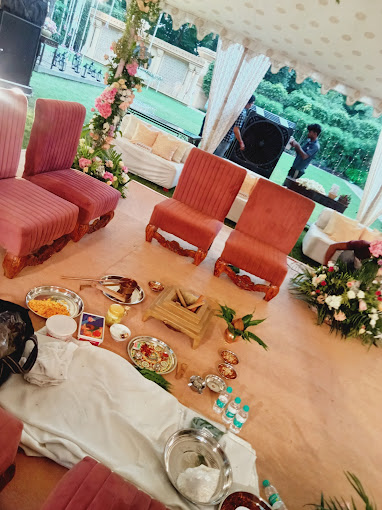- aryasamajmandirjpr@gmail.com
- +917976086454
Solah Sanskar Vidhi

Solah Sanskar Vidhi
The Solah Sanskar Vidhi is a series of rituals performed at various stages of life in accordance with Hindu dharma. Below is a step-by-step explanation of each samskara (rite) and its vidhi (procedure):
1. Garbhadhana Sanskar (Conception Ritual)
- When: Before conception.
- Vidhi:
- Couple offers prayers to deities, especially Lord Vishnu and Goddess Lakshmi, for virtuous offspring.
- Recitation of Vedic mantras and performance of a small havan.
2. Pumsavana Sanskar (Fetus Development)
- When: During the third or fourth month of pregnancy.
- Vidhi:
- A ritual is conducted for the health of the fetus.
- The expectant mother consumes a herbal mixture blessed with mantras for the baby’s well-being.
3. Simantonnayana Sanskar (Baby Shower)
- When: In the fifth or seventh month of pregnancy.
- Vidhi:
- The mother is adorned with new clothes and jewelry.
- Mantras are recited for safe delivery and protection from negative energies.
- Family members bless the mother and offer gifts.
4. Jatakarma Sanskar (Birth Ceremony)
- When: Immediately after the child is born.
- Vidhi:
- The father performs a ritual of touching honey and ghee to the baby’s lips while chanting mantras.
- Prayers are offered for the child’s health and long life.
5. Namkaran Sanskar (Naming Ceremony)
- When: On the 11th day after birth or an auspicious day.
- Vidhi:
- The priest conducts a puja to invoke blessings for the child.
- The chosen name is whispered into the child’s ear and announced to family members.
6. Nishkraman Sanskar (First Outing)
- When: In the fourth month after birth.
- Vidhi:
- The baby is introduced to sunlight and moonlight in a brief ceremony.
- Family members offer prayers and blessings.
7. Annaprashan Sanskar (First Feeding)
- When: In the sixth month after birth.
- Vidhi:
- The priest conducts a puja, and the baby is fed a small portion of kheer (sweet rice pudding) for the first time.
- Family members take turns feeding the baby and offer blessings.
8. Chudakarana Sanskar (Mundan Ceremony)
- When: Between the first and third year of the child.
- Vidhi:
- The child’s head is shaved while chanting mantras to symbolize purification.
- The hair is offered to a holy river or buried ceremonially.
9. Karnavedha Sanskar (Ear Piercing)
- When: In infancy or early childhood.
- Vidhi:
- The ears are pierced while mantras are recited.
- The child is blessed for a sharp intellect and good health.
10. Vidyarambha Sanskar (Beginning of Education)
- When: Around the age of 5.
- Vidhi:
- The child writes their first letter, often in rice grains, under the priest’s guidance.
- Prayers are offered to Goddess Saraswati for wisdom and learning.
11. Upanayana Sanskar (Sacred Thread Ceremony)
- When: Between the ages of 8 and 16 (for boys, and optionally for girls in modern traditions).
- Vidhi:
- The child is given the sacred thread (yajnopavita) and initiates their spiritual learning.
- The Gayatri Mantra is taught, and the child takes vows of discipline and learning.
12. Vedarambha Sanskar (Start of Vedic Studies)
- When: After Upanayana Sanskar.
- Vidhi:
- The student begins learning scriptures under the guidance of a guru.
- A havan is performed, and mantras are recited for knowledge and concentration.
13. Keshanta Sanskar (First Shaving)
- When: During adolescence, typically at puberty.
- Vidhi:
- The first beard or moustache is ceremonially shaved.
- The young adult is reminded of their responsibilities toward family and society.
14. Samavartana Sanskar (Graduation Ceremony)
- When: After completing Vedic or formal education.
- Vidhi:
- A ceremonial bath signifies the end of education.
- The graduate seeks blessings from the guru and parents before starting a new phase of life.
15. Vivaha Sanskar (Marriage Ceremony)
- When: At the time of marriage.
- Vidhi:
- Includes rituals like Ganesh Puja, Kanyadaan (giving away the bride), and Saptapadi (seven steps around the fire).
- The couple vows to support and respect each other.
16. Antyeshti Sanskar (Last Rites)
- When: After death.
- Vidhi:
- The body is cremated, and mantras are recited for the peace of the departed soul.
- Ashes are immersed in a holy river, and Shraddha rituals are performed to honor the ancestors.
